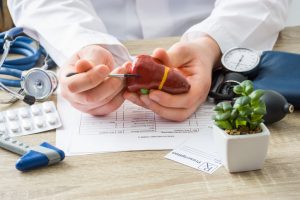 The liver plays an essential role in helping our bodies to digest food, maintain healthy blood sugar levels, manage the clotting of blood, and remove harmful chemicals from the blood.
The liver plays an essential role in helping our bodies to digest food, maintain healthy blood sugar levels, manage the clotting of blood, and remove harmful chemicals from the blood.
When our liver is damaged or not functioning properly it can lead to complications such as liver disease, which can potentially become life-threatening.
People with early-stage liver damage or disease may not experience symptoms. However, as time progresses, the body may send warning signs to let us know that the liver is not working the way it should.
Paying attention to these signs and receiving timely treatment can reduce the risk of serious illnesses. Here are five signs you should not ignore:
- Itchy skin
- Jaundice (Yellowing of the skin and eyes)
- Edema (Swelling in the arms and legs)
- Bruising easily
- Nausea and vomiting
Treatment for liver disease may include medications, lifestyle changes, or in some cases, liver transplantation.
There are steps you can take to prevent certain types of liver disease. This includes eating less red meat, maintaining a healthy weight, limiting or avoiding the consumption of alcohol, exercising, and getting the hepatitis A and B vaccine if you are at risk.
All content of this newsletter is intended for general information purposes only and is not intended or implied to be a substitute for professional medical advice, diagnosis or treatment. Please consult a medical professional before adopting any of the suggestions on this page. You must never disregard professional medical advice or delay seeking medical treatment based upon any content of this newsletter. PROMPTLY CONSULT YOUR PHYSICIAN OR CALL 911 IF YOU BELIEVE YOU HAVE A MEDICAL EMERGENCY.
